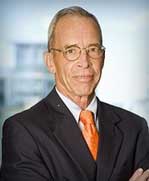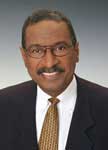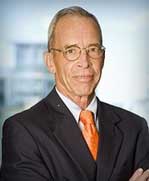 KINGSTON, R.I. – Aug. 20, 2014 – Half a century ago Providence lawyer Malcolm Farmer was beaten for defending civil rights workers in the segregated South, but it feels like yesterday.
KINGSTON, R.I. – Aug. 20, 2014 – Half a century ago Providence lawyer Malcolm Farmer was beaten for defending civil rights workers in the segregated South, but it feels like yesterday.
“I will never forget it,” says Farmer. “It had a distinct impact on me. I became much more radical in my beliefs that the system had to change.”
Now Farmer and other civil rights activists from New England will have their stories preserved forever, thanks to the University of Rhode Island. URI’s Multicultural Center will record interviews with 18 activists to honor the 50th anniversary of the Freedom Summer Project.
The project was a nonviolent movement in the summer of 1964 to integrate Mississippi’s political system, which prohibited African Americans from voting.
Hundreds of college students from the North traveled to the state to try to register African Americans, create a new political party and establish Freedom Schools to learn about politics.
Many were beaten and threatened by law enforcement officers and angry residents who resented their presence. Three activists – Michael Schwerner, Andrew Goodman and James Chaney – were murdered, their bodies found in a shallow grave outside a small Mississippi town.
 Melvin Wade, the center’s director, came up with the idea for the oral histories as a powerful way to remember Freedom Summer and subsequent years of struggle. The interviews will start at 9 a.m. Sept. 29 at Chafee Hall, Room 217, and continue until they’re finished.
Melvin Wade, the center’s director, came up with the idea for the oral histories as a powerful way to remember Freedom Summer and subsequent years of struggle. The interviews will start at 9 a.m. Sept. 29 at Chafee Hall, Room 217, and continue until they’re finished.
Wade credits Freedom Summer with inspiring President Lyndon B. Johnson and Congress to pass the Civil Rights Act of 1964 and the Voting Rights Act of 1965 and with raising awareness about racism and discrimination throughout the country.
The daylong program, part of URI’s Diversity Week, will also include talks by civil rights workers, film screenings and question-and-answer sessions. All events are open to the public.
“Having grown up in Mississippi, I attended the Mississippi Freedom Summer 50th. Conference earlier this year convened by civil rights icon Bob Moses to honor those who fought for the end of militant white supremacy in Mississippi – a goal which I did not see on the horizon as a college student activist in 1964,” says Wade. “At the conference, I was pleasantly surprised by the number of Freedom Summer veterans from New England who mentioned that they knew other colleagues.”
Wade says he hopes to coordinate the recordings of more civil rights activists from New England over the years, collaborate with activists in building a communications network and establish a digital archive for researchers.
“As I have spoken with the activists, I have learned that the vast majority of them view their participation in the Freedom Summer Project as the most transformative event of their lives, influencing life trajectories up to the present,” Wade says.
The activists participating in the URI program agree.
From 1965 to 1967, Farmer, then in his mid-20s, worked for the Lawyers Constitutional Defense Committee, handling hundreds of cases brought against civil rights workers, ranging from obstructing justice to disturbing the peace. Once, a hostile deputy sheriff pointed a shotgun at his head. Another time, he had to curl up to protect himself from deputies kicking him.
The Yale and Harvard Law School graduate says he learned about “courage, humanity, evil, racism and justice.” The work, he says, sparked a lifelong commitment to civil rights, including gay rights.
“I was blessed to have the opportunity to go through that experience,” says Farmer, a partner with Hinckley, Allen and Snyder. “It’s an experience I was very, very lucky to have.”
 The other Rhode Islander to be interviewed is Michael S. Van Leesten, who was beaten and hit with pepper spray by Ku Klux Clan members as he tried to register African Americans to vote in 1965. Van Leesten and his colleagues in the Summer Community Organization and Political Education program succeeded in registering 1,000 voters, despite the cruelty.
The other Rhode Islander to be interviewed is Michael S. Van Leesten, who was beaten and hit with pepper spray by Ku Klux Clan members as he tried to register African Americans to vote in 1965. Van Leesten and his colleagues in the Summer Community Organization and Political Education program succeeded in registering 1,000 voters, despite the cruelty.
“I became deeply committed to supporting black progress in this country,” says Van Leesten, founder of The Van Leesten Group, an urban planning and community development company. “I’ve spent my life working to advance human rights.”
Others to be interviewed are: Gloria J. Clark, occupational therapist and community activist, New Bedford, Mass.; Thomas N. Gardner, professor of communications, Westfield State University, Westfield, Mass.; David A. Gass, community developer and advocate for community gardens, Lynn, Mass.; James G. Kates, poet, literary translator and co-publisher, Zephyr Press, Fitzwilliam, N.H.; James P. Marshall, author of “Student Activism and Civil Rights in Mississippi: Protest Politics and the Struggle for Racial Justice, 1960-1965,” Brookline, Mass.; John M. Pratt, former state representative and town selectman, Walpole, N.H.; David P. Riley, professional mediator, Providence, RI; Gary S. Rothberger, civil rights lawyer, Cambridge, Mass; Nancy J. Schieffelin, artist and clinical social worker, Belmont, Mass; E. Michael Thelwell, professor emeritus, W. E. B. DuBois Department of African American Studies, University of Massachusetts, Amherst, Mass.; David Trimble, clinical assistant professor, Center for Multicultural Training in Psychology, Boston University, Brookline, Mass; Bishop Arthur E. Walmsley, former Episcopal staff, Commission on Religion and Race, National Council of Churches, Deering, N.H.; Dan Lynn Watt and Molly Lynn Watt, poets, folksingers and performing artists, Cambridge, Mass.; and Norman S. Zalkind, partner, Zalkind, Duncan and Bernstein, Boston, Mass.
Kates went to Mississippi his freshman year at Wesleyan University. The journey changed his life.
 “We were a generation of people who thought we owed something to our country and world and that it was our responsibility to try to make it a better place,” he says. “The experience helped me understand what the world was about and how I could work to change it.”
“We were a generation of people who thought we owed something to our country and world and that it was our responsibility to try to make it a better place,” he says. “The experience helped me understand what the world was about and how I could work to change it.”
Fresh out of Columbia University Law School, Pratt worked for the National Council of Churches, defending clergy and activists. He also recruited and advised other lawyers in the movement.
“It made clear to me the deprivations that take place in America for minorities, blacks, women and Hispanics,” says Pratt, commissioner of Cheshire County in New Hampshire and a former state representative. “I’ve devoted a fair part of my adult life to try to remove those disparities.”
Schieffelin, a clinical social worker and painter, worked as a teacher in the Freedom Schools, established in churches and stores to teach people politics, leadership skills and African American history, as well as math and reading.
“The experience changed my whole perception about the country and the nature of how people relate to one another,” says Schieffelin, who went to Mississippi in the summer of 1964 when she was a student at Brown University. “I’d never seen that degree of poverty. I’d never seen segregation. All of it seemed so brutal. Going there radicalized me. I was angry and upset and rattled and disturbed by everything. Now, I’m deeply involved in supporting causes related to social justice.”
Other events include:
• Screening of the film “Freedom Summer” on Sept. 28 from 7 to 10 p.m. at Edwards Hall Auditorium.
• Screening of the film “Mississippi: Is This America? 1962-1964” on Sept. 29 from 11 a.m. to noon at the Multicultural Center.
• Talk by Bruce Watson, journalist and author of “Freedom Summer: The Savage Season That Made Mississippi Burn and Made America a Democracy,” on Sept. 29 from 1 to 1:50 p.m. at the Multicultural Center.
• Talk by Marshall, Freedom Summer participant and author of “Student Activism and Civil Rights in Mississippi: Protest Politics and the Struggle for Racial Justice, 1960-1965,” on Sept. 29 from 2 to 2:50 p.m. at the Multicultural Center.
• Conversation with Freedom Summer participants on Sept. 29 from 4 to 5:30 p.m. at the Memorial Union, Ballroom.
Portrait photos above courtesy of Malcolm Farmer, Melvin Wade and Michael Van Leesten.
Photo above: Freedom Summer activists sing before leaving training sessions at Western College for Women in Oxford, Ohio, for Mississippi in June 1964. Credit Ted Polumbaum Collection.

